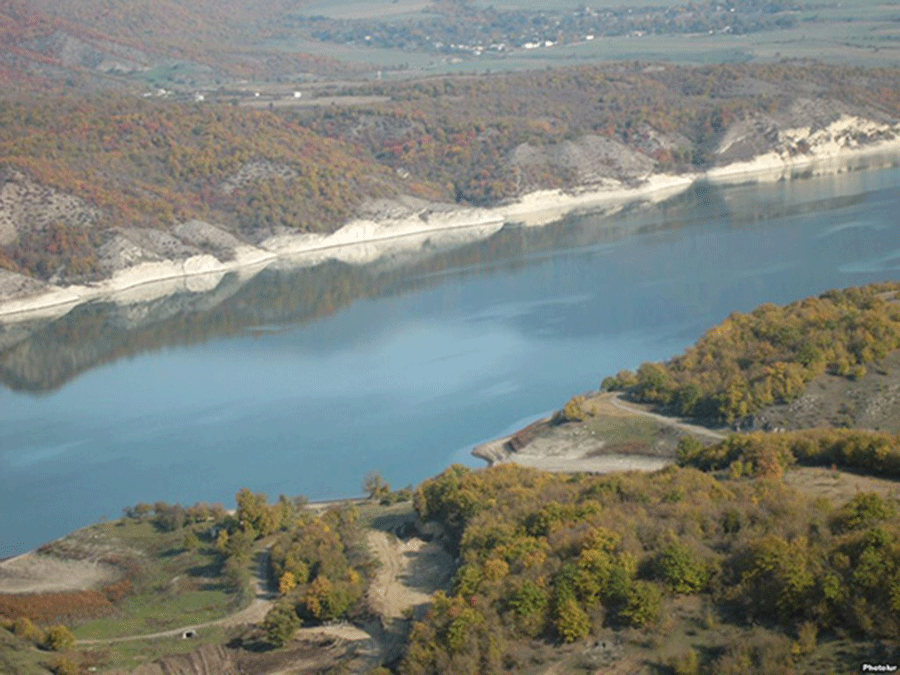by Muriel Mirak-Weissbach
In the lead up to and then after the remarkable acts of aggression by Azerbaijan which led to the forced expulsion of Armenians from Artsakh (Nagorno Karabakh), analyses by various experts, politicians and scholars have focused on the ethnic, religious and geopolitical causes. A long history of conflict documents all three aspects, and during the 2020 war, the racist character of Baku’s military campaign was blatant. In their “victory day” celebration in Baku in December 2020, Azerbaijan’s President Ilham Aliyev and his Turkish counterpart, Recep Tayyip Erdogan left no doubt that they viewed the campaign to de-Armenianize the region as a continuation of what began in 1915. When Artsakh Armenians were expelled in 2023, international voices raised accusations of genocide.
Yet, this may not be the only factor fueling the continuing anti-Armenian crusade in this region. Writing in the Frankfurter Allgemeine Zeitung on December 5, free-lance German journalist Ira Peter examined the issue of water resources as a casus belli. Peter, who was born in Kazakhstan and knows the Caucasus region well, reported from Lemut, a village in Armenia’s Shirak region. She spoke with local residents, as well as representatives of organizations like Caritas and Armenian Women for Health and Healthy Environment (AWHHE), which are dealing with the negative impact of deteriorating water resources. Her findings indicate that water resources constitute an “underestimated war aim,” and the argument makes sense.
Read also
The article presents the facts and figures depicting a severe water crisis. Water resources in the Shirak region have deteriorated and shrunk in the last 30 years, since the Soviet-era irrigation system of canals fell out of use with the dissolution of large agricultural concerns. Unused water pipes and other hardware deteriorated materially, something Caritas has been working to restore. Climate change has further aggravated the situation. Citing Emma Anakhasian of the AWHHE, Peter reports that between 1929 and 2016, temperatures in Armenia increased by 1.23 degrees while from 1935 to 2012, annual rainfall dropped by 10 per cent. Agriculture suffered, as less ground water was available, rivers and mineral water sources dried up, and salt invaded the soil. A good 40 percent of farmland was affected. Mining activities have caused further ecological damage to water sources, like the Arpa and Vorotan rivers. This has also affected Lake Sevan, whose water has relevance also for Georgia and Azerbaijan.
It is in this connection that water acquires strategic significance, it is the juncture where water and war meet. Unlike Armenia, writes Peter, Azerbaijan “has almost no water resources.” Other international agencies estimate that the country is 70-90 percent dependent on external sources for water. In Anakhasian’s view, “The Nagorno Karabakh wars were not about ethnic conflict; Azerbaijan wanted to have our water resources.” She substantiates this view with reference to studies done by the independent Conflict and Environment Observatory (CEOBS).
According to their 2020 report, Azerbaijan suffered a severe water shortage in summer that year, as water from the Kura river, which flows through Turkey and Georgia, had sunk 2½ meters, and seawater from the Caspian had begun flowing in. The water level gauge of Azerbaijan’s biggest dam also dropped 16 meters. The obvious result was a critical shortage for drinking water and agriculture.
The CEOBS report concludes that Azerbaijan therefore sought militarily to take control of water rich Nagorno Karabakh. Anakhasian is quoted saying she thinks Baku has further ambitions, namely, to gain access to Lake Sevan, which is very close to the border, as well as Jermuk, which was targeted in 2022.
This analysis, appearing a prominent national German daily, is well worth considering, particularly when one reflects on similar discussions pertaining to the causes of enduring regional conflicts; in the Middle East, for example, control over waters from the Litani and Jordan rivers, in Southern Lebanon and Jordan, respectively, as well as Lake Tiberias in the Golan heights, has played a central role. The same applies to the Horn of Africa, where conflict over use of the Nile waters has a long history.
(The article referenced is “Das unterschätzte Kriegsziel,” Ira Peter, Lemut, Frankfurter Allgemeine Zeitung, December 5, 2023, p. 11.)

























































